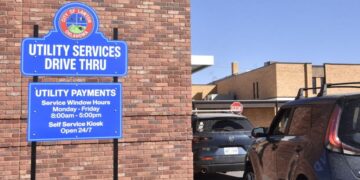Lawton has a new agreement with the entity that plans to build a cobalt/nickel refinery in southwest Lawton.
The new terms for that amended agreement with Westwin Elements wove their way through three other entities Wednesday before reaching the City Council floor at 2 p.m. for that group’s approval. The terms change the details of an agreement originally entered in February, one that promises a $24 million local incentive package (plus $7 million in infrastructure upgrades) for what is now estimated to be a $732.5 million refinery that will be built south of the west industrial park on West Lee Boulevard.
The total value of the local incentive package hasn’t changed — officials said that repeatedly Wednesday — but the details that specify the money and land to be given to Westwin Elements have been updated to reflect major changes, to include a new technical crew that will create then run the refinery and plans to build a pilot plant. That plant will be part of the process to win additional funding for what officials say will be the U.S.’s first cobalt refinery.
The need for a pilot plant was one of the sticking points for members of the Lawton Economic Development Authority (LEDA) and Comanche County Industrial Development Authority (CCIDA), who, with the City of Lawton, are the major local components of the agreement. CCIDA is putting up a $2 million loan and ownership of 480 acres it owns in southwest Lawton. The City Council has designated LEDA to handle the project and the city’s $10 million incentive package. Lawton Economic Development Corporation also is part of the process, working as the facilitator for the weeks of negotiation among community leaders, economic development entities and Westwin Elements.
CCIDA members discussed the issue in depth at their late morning meeting, ultimately voting 6-2 (with one abstention) to approve the agreement conditional upon adding a surety bond to ensure the pilot plant building would be cleaned of any hazardous materials if the project proves unsuccessful. The agreement already specifies Westwin Elements must have a clean-up insurance policy on the building, and new provisions specify the building and land will revert to CCIDA should the project fail.
LEDC President Brad Cooksey said ownership of that building and restoration of the land to its original owner (CCIDA) is one of the strongest protections in the agreement, essentially making it a win-win situation for Lawton. CCIDA officials agreed.
“If something goes wrong, CCIDA owns the building,” said Mike Mayhall, attorney for CCIDA. The provision would restore marketable land to CCIDA, along with a “spec building” that many industrial prospects are looking for when they visit a community and something Lawton can’t provide now.
Fred Fitch, a CCIDA member who also chairs LEDA, said the pilot plant is part of Westwin Element’s funding strategy. The plant will provide the data necessary for a bankable feasibility study, the document bankers will demand before deciding if they will lend money to Westwin. Cooksey said others who might designate funding for the project, including the federal government, also will want to see the study.
While the new terms specify the return of the land and building to CCIDA, member Scott Hayes said he wanted that specific phrasing inserted into the agreement so there is no doubt.
CCIDA member Karol Haney (who voted no) had another concern: she said the authority should publicly address concerns about hazardous waste and their disposal and cleanup before approving any document. Haney said she already is receiving calls from residents concerned about that issue, and can’t answer their concerns. Resident Larry Cotton, who lives downwind of the refinery site, echoed those concerns, telling CCIDA members he is concerned about hazardous waste and exactly what will be used in the refining process.
LEDA members also addressed the issue, expressing concerns about potential contamination of the refinery building and what happens should that building revert to local ownership. Dr. Ernie Sheppard asked where the money would come from to clean the building, adding if the local money already has been spent, “there is no way to clean it up.”
“We ought to make sure,” Sheppard said, of provisions LEDA could take.
Ward 4 Councilman George Gill said a surety bond would guarantee that cleanup, and he recommended that be made part of the final agreement (during the council meeting, attorneys said that provision is something that must be negotiated separately). Interim City Manager John Ratliff said the agreement already contains a provision requiring $14 million in cleanup insurance, funds he said could be used for any building, soil or land contamination.
Want to reach a local audience and grow your business?
Our website is the perfect platform to connect with engaged readers in your local area.
Whether you're looking for banner ads, sponsored content, or custom promotions, we can tailor a package to meet your needs.
Contact us today to learn more about advertising opportunities!
CONTACT US NOW





